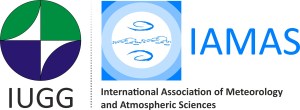At the IAMAS Scientific Assembly in Cape Town, South Africa during August 2017 the IAMAS Executive Committee approved the following resolution regarding the need for continuation and enhancement of Earth Observation systems to monitor the atmosphere, ocean and other elements of the Earth system.
We would be grateful if you could forward this resolution to relevant organizations and individuals concerned with Earth observation and related activities.

IAMAS Resolution Regarding Earth Observation
The International Association of Meteorology and Atmospheric Sciences (IAMAS) of the International Union of Geodesy and Geophysics (IUGG) stresses the importance of the collection of data that supports an understanding of the Earth System, including its changes and evolution. We all depend on the Earth. Increasingly we rely on weather forecasts as well as predictions of high impact events such as hurricanes to both benefit our lifestyle and avoid catastrophe. Without the gathering of data, improvements to our ability to predict these events could not occur. We are concerned about current propositions within the United States of America to shut down a variety of efforts to gather data in support of understanding and maintaining our records of the atmosphere, the oceans, and other elements of the Earth system that enable improvements in our ability to predict and project future conditions on Earth. The economic benefits of improved weather prediction are well established, and we are just learning how to improve predictions on longer time scales. The cancellation of current satellite missions will cause great harm to these improvements and thereby can only lead to great economic as well as human harm. We urge the Congress of the United States to continue to stand by the scientific community that is working towards improvements of our livelihood by continuing to support these important satellite missions.
Whereas the development and maintenance of scientific data records regarding atmospheric, oceanic and earth sciences provides a great economic advantage to the world’s people, we urge the United States to maintain and improve these records through its continued support of Earth observing systems (including scientific satellite missions).
Considering:
- The importance of the collection of environmental data that supports an understanding of the Earth’s geophysical processes, including its changes and evolution.
- That Earth as our habitat represents a resource on which we all depend.
- That increasingly we rely on weather forecasts as well as predictions of high impact events such as hurricanes to maintain infrastructure, enable commerce and benefit our lifestyle and avoid catastrophe and that without the gathering of data, improvements to our ability to predict these events could not occur.
- That these data enable improvements in our ability to predict and project future conditions on Earth.
Acknowledging:
- That the economic benefits of improved weather prediction are well established, continuing and improving observing systems are essential to monitoring, understanding, and prediction on longer time scales.
Urges:
- That the Congress of the United States, as well as the legislative bodies of other nations,continue to stand by the scientific community that is working towards improvements of our livelihood by continuing to support these important satellite missions and fully support satellite missions that are aimed at improving scientific study of the Earth.
- That the United States, as well as all nations, maintains and improves the satellite data records through its continued support of scientific satellite missions.
- That observational systems in general continue to be supported.
Resolves:
- To continue and amplify national and international research efforts on the use of satellite data to improve prediction of the Earth System at all scales.
Approved by the Executive Committee of IAMAS, November 2017
Endorsed by the IUGG Bureau, 27 November 2017
IAMAS Resolution on Earth Observation (PDF Version)
IAMAS Cover Letter (PDF version)
